Focus Group Research on Diabetes in King County, Washington State
VerifiedAdded on 2022/09/14
|8
|1611
|18
Report
AI Summary
This report presents a qualitative research study using focus groups to investigate diabetes mellitus within the African American community in King County, Seattle, Washington State, USA. The study addresses the public health problem of diabetes, highlighting contributing factors such as obesity and family history. The research employs a qualitative design with semi-structured interviews to gather participants' perceptions on diabetes, including their experiences, contributing factors, treatment methods, and potential solutions. The study includes interview questions, a detailed methodology section outlining data collection through face-to-face interviews, and data analysis using a grounded theory approach with MaxQDA software. An informed consent form is also included, detailing participant rights and confidentiality measures. The report aims to provide insights into the challenges and potential solutions related to diabetes in the chosen community.

Running head: FOCUS GROUP RESEARCH
FOCUS GROUP RESEARCH
Phuong Phan
Walden University
FOCUS GROUP RESEARCH
Phuong Phan
Walden University
Paraphrase This Document
Need a fresh take? Get an instant paraphrase of this document with our AI Paraphraser
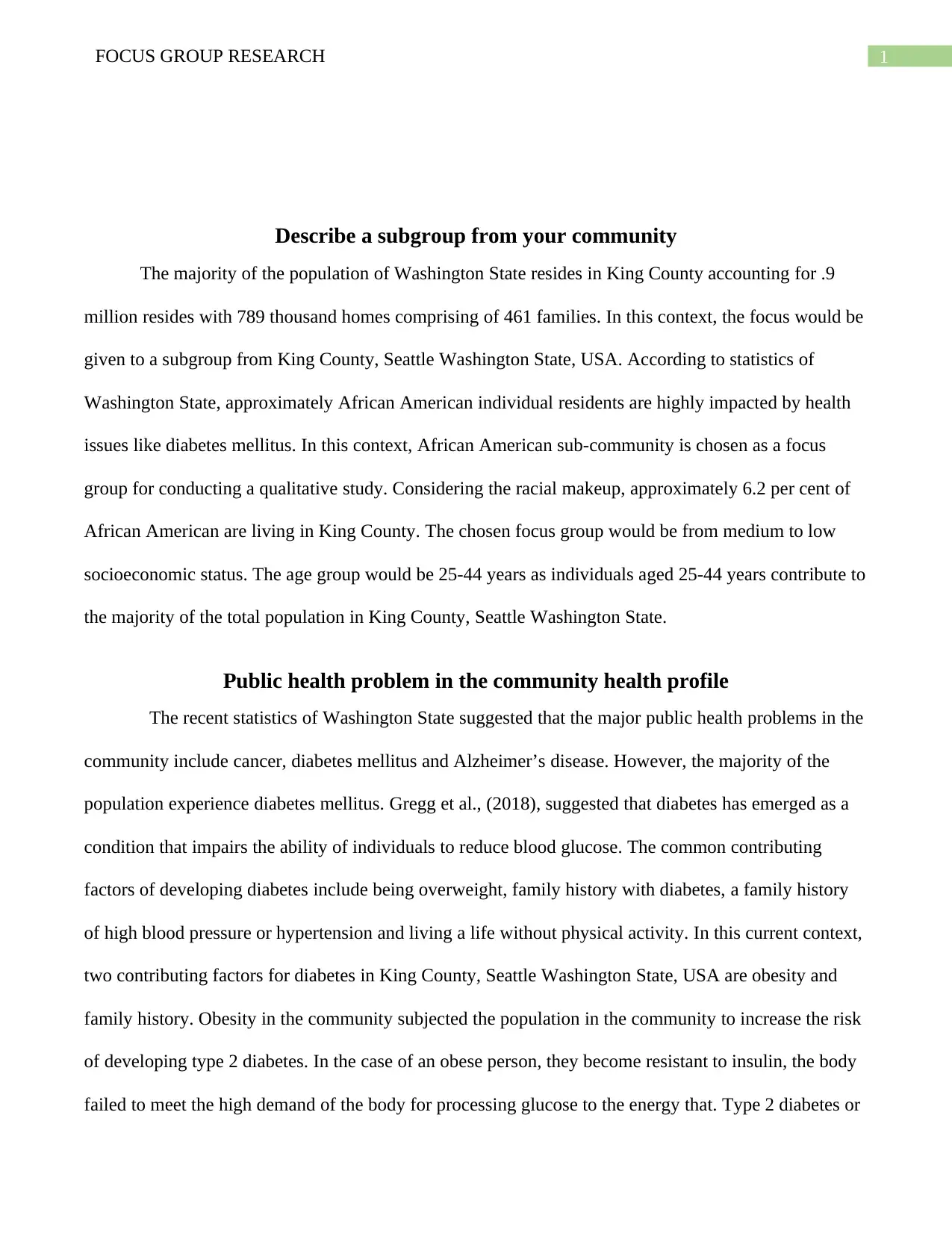
1FOCUS GROUP RESEARCH
Describe a subgroup from your community
The majority of the population of Washington State resides in King County accounting for .9
million resides with 789 thousand homes comprising of 461 families. In this context, the focus would be
given to a subgroup from King County, Seattle Washington State, USA. According to statistics of
Washington State, approximately African American individual residents are highly impacted by health
issues like diabetes mellitus. In this context, African American sub-community is chosen as a focus
group for conducting a qualitative study. Considering the racial makeup, approximately 6.2 per cent of
African American are living in King County. The chosen focus group would be from medium to low
socioeconomic status. The age group would be 25-44 years as individuals aged 25-44 years contribute to
the majority of the total population in King County, Seattle Washington State.
Public health problem in the community health profile
The recent statistics of Washington State suggested that the major public health problems in the
community include cancer, diabetes mellitus and Alzheimer’s disease. However, the majority of the
population experience diabetes mellitus. Gregg et al., (2018), suggested that diabetes has emerged as a
condition that impairs the ability of individuals to reduce blood glucose. The common contributing
factors of developing diabetes include being overweight, family history with diabetes, a family history
of high blood pressure or hypertension and living a life without physical activity. In this current context,
two contributing factors for diabetes in King County, Seattle Washington State, USA are obesity and
family history. Obesity in the community subjected the population in the community to increase the risk
of developing type 2 diabetes. In the case of an obese person, they become resistant to insulin, the body
failed to meet the high demand of the body for processing glucose to the energy that. Type 2 diabetes or
Describe a subgroup from your community
The majority of the population of Washington State resides in King County accounting for .9
million resides with 789 thousand homes comprising of 461 families. In this context, the focus would be
given to a subgroup from King County, Seattle Washington State, USA. According to statistics of
Washington State, approximately African American individual residents are highly impacted by health
issues like diabetes mellitus. In this context, African American sub-community is chosen as a focus
group for conducting a qualitative study. Considering the racial makeup, approximately 6.2 per cent of
African American are living in King County. The chosen focus group would be from medium to low
socioeconomic status. The age group would be 25-44 years as individuals aged 25-44 years contribute to
the majority of the total population in King County, Seattle Washington State.
Public health problem in the community health profile
The recent statistics of Washington State suggested that the major public health problems in the
community include cancer, diabetes mellitus and Alzheimer’s disease. However, the majority of the
population experience diabetes mellitus. Gregg et al., (2018), suggested that diabetes has emerged as a
condition that impairs the ability of individuals to reduce blood glucose. The common contributing
factors of developing diabetes include being overweight, family history with diabetes, a family history
of high blood pressure or hypertension and living a life without physical activity. In this current context,
two contributing factors for diabetes in King County, Seattle Washington State, USA are obesity and
family history. Obesity in the community subjected the population in the community to increase the risk
of developing type 2 diabetes. In the case of an obese person, they become resistant to insulin, the body
failed to meet the high demand of the body for processing glucose to the energy that. Type 2 diabetes or
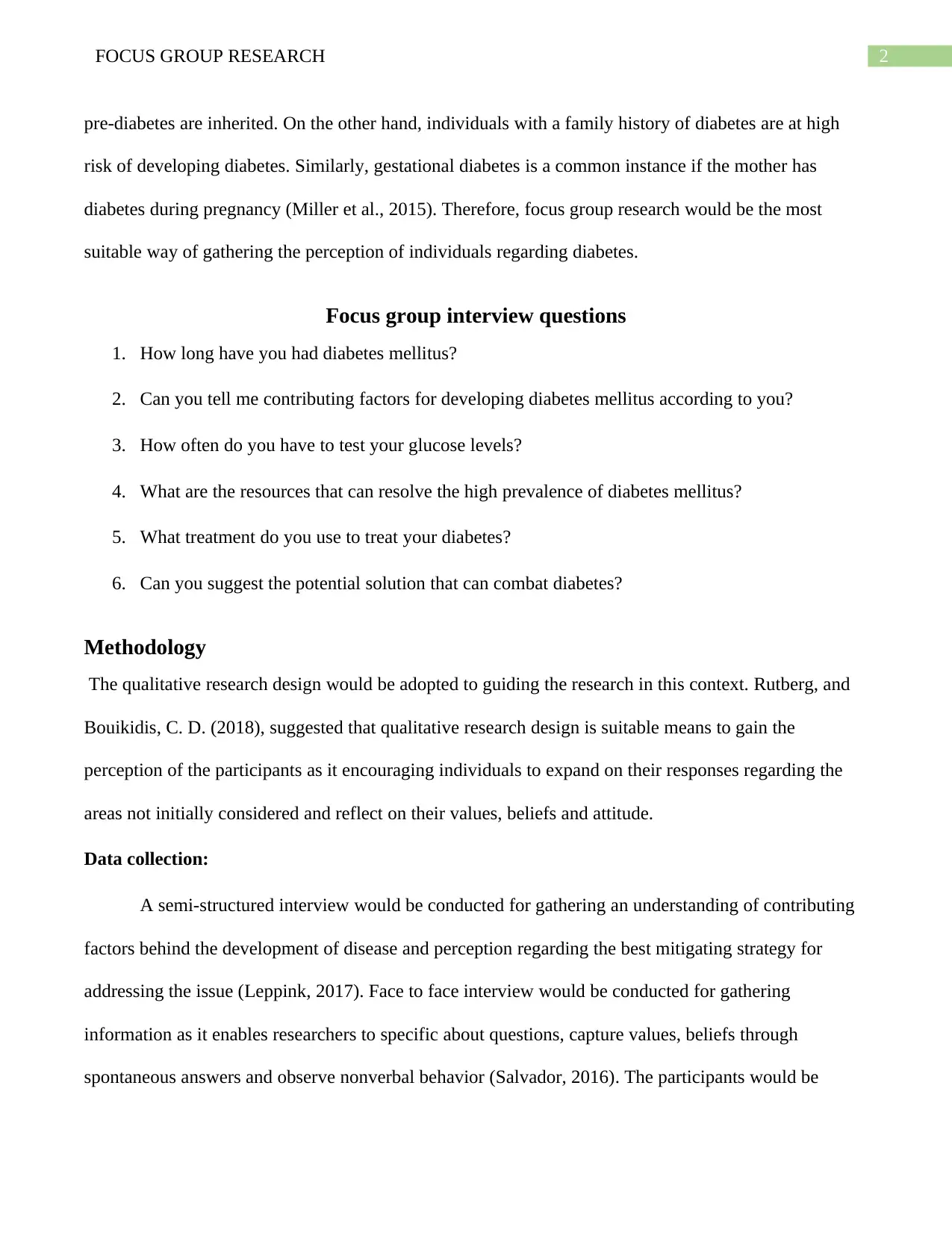
2FOCUS GROUP RESEARCH
pre-diabetes are inherited. On the other hand, individuals with a family history of diabetes are at high
risk of developing diabetes. Similarly, gestational diabetes is a common instance if the mother has
diabetes during pregnancy (Miller et al., 2015). Therefore, focus group research would be the most
suitable way of gathering the perception of individuals regarding diabetes.
Focus group interview questions
1. How long have you had diabetes mellitus?
2. Can you tell me contributing factors for developing diabetes mellitus according to you?
3. How often do you have to test your glucose levels?
4. What are the resources that can resolve the high prevalence of diabetes mellitus?
5. What treatment do you use to treat your diabetes?
6. Can you suggest the potential solution that can combat diabetes?
Methodology
The qualitative research design would be adopted to guiding the research in this context. Rutberg, and
Bouikidis, C. D. (2018), suggested that qualitative research design is suitable means to gain the
perception of the participants as it encouraging individuals to expand on their responses regarding the
areas not initially considered and reflect on their values, beliefs and attitude.
Data collection:
A semi-structured interview would be conducted for gathering an understanding of contributing
factors behind the development of disease and perception regarding the best mitigating strategy for
addressing the issue (Leppink, 2017). Face to face interview would be conducted for gathering
information as it enables researchers to specific about questions, capture values, beliefs through
spontaneous answers and observe nonverbal behavior (Salvador, 2016). The participants would be
pre-diabetes are inherited. On the other hand, individuals with a family history of diabetes are at high
risk of developing diabetes. Similarly, gestational diabetes is a common instance if the mother has
diabetes during pregnancy (Miller et al., 2015). Therefore, focus group research would be the most
suitable way of gathering the perception of individuals regarding diabetes.
Focus group interview questions
1. How long have you had diabetes mellitus?
2. Can you tell me contributing factors for developing diabetes mellitus according to you?
3. How often do you have to test your glucose levels?
4. What are the resources that can resolve the high prevalence of diabetes mellitus?
5. What treatment do you use to treat your diabetes?
6. Can you suggest the potential solution that can combat diabetes?
Methodology
The qualitative research design would be adopted to guiding the research in this context. Rutberg, and
Bouikidis, C. D. (2018), suggested that qualitative research design is suitable means to gain the
perception of the participants as it encouraging individuals to expand on their responses regarding the
areas not initially considered and reflect on their values, beliefs and attitude.
Data collection:
A semi-structured interview would be conducted for gathering an understanding of contributing
factors behind the development of disease and perception regarding the best mitigating strategy for
addressing the issue (Leppink, 2017). Face to face interview would be conducted for gathering
information as it enables researchers to specific about questions, capture values, beliefs through
spontaneous answers and observe nonverbal behavior (Salvador, 2016). The participants would be
⊘ This is a preview!⊘
Do you want full access?
Subscribe today to unlock all pages.

Trusted by 1+ million students worldwide
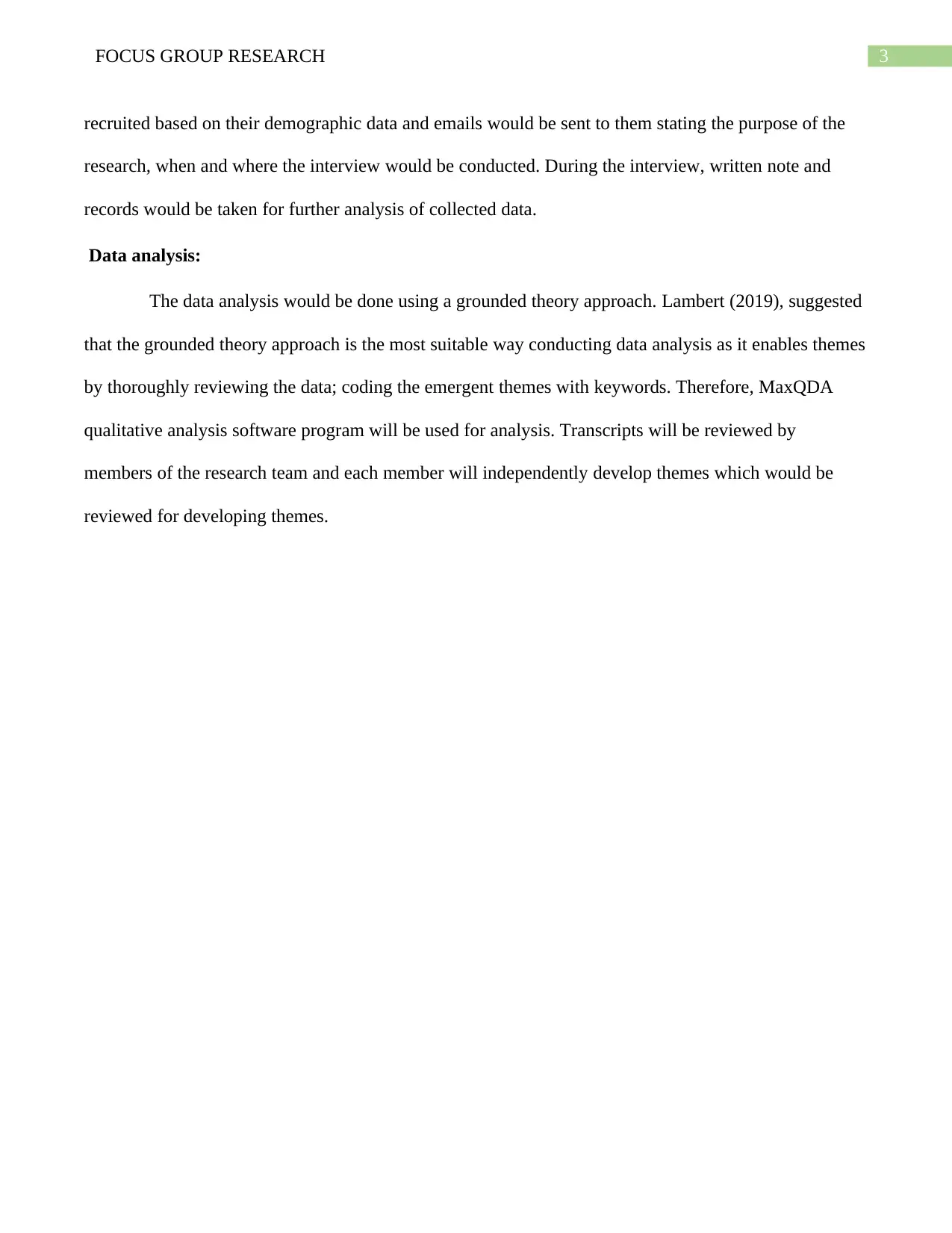
3FOCUS GROUP RESEARCH
recruited based on their demographic data and emails would be sent to them stating the purpose of the
research, when and where the interview would be conducted. During the interview, written note and
records would be taken for further analysis of collected data.
Data analysis:
The data analysis would be done using a grounded theory approach. Lambert (2019), suggested
that the grounded theory approach is the most suitable way conducting data analysis as it enables themes
by thoroughly reviewing the data; coding the emergent themes with keywords. Therefore, MaxQDA
qualitative analysis software program will be used for analysis. Transcripts will be reviewed by
members of the research team and each member will independently develop themes which would be
reviewed for developing themes.
recruited based on their demographic data and emails would be sent to them stating the purpose of the
research, when and where the interview would be conducted. During the interview, written note and
records would be taken for further analysis of collected data.
Data analysis:
The data analysis would be done using a grounded theory approach. Lambert (2019), suggested
that the grounded theory approach is the most suitable way conducting data analysis as it enables themes
by thoroughly reviewing the data; coding the emergent themes with keywords. Therefore, MaxQDA
qualitative analysis software program will be used for analysis. Transcripts will be reviewed by
members of the research team and each member will independently develop themes which would be
reviewed for developing themes.
Paraphrase This Document
Need a fresh take? Get an instant paraphrase of this document with our AI Paraphraser
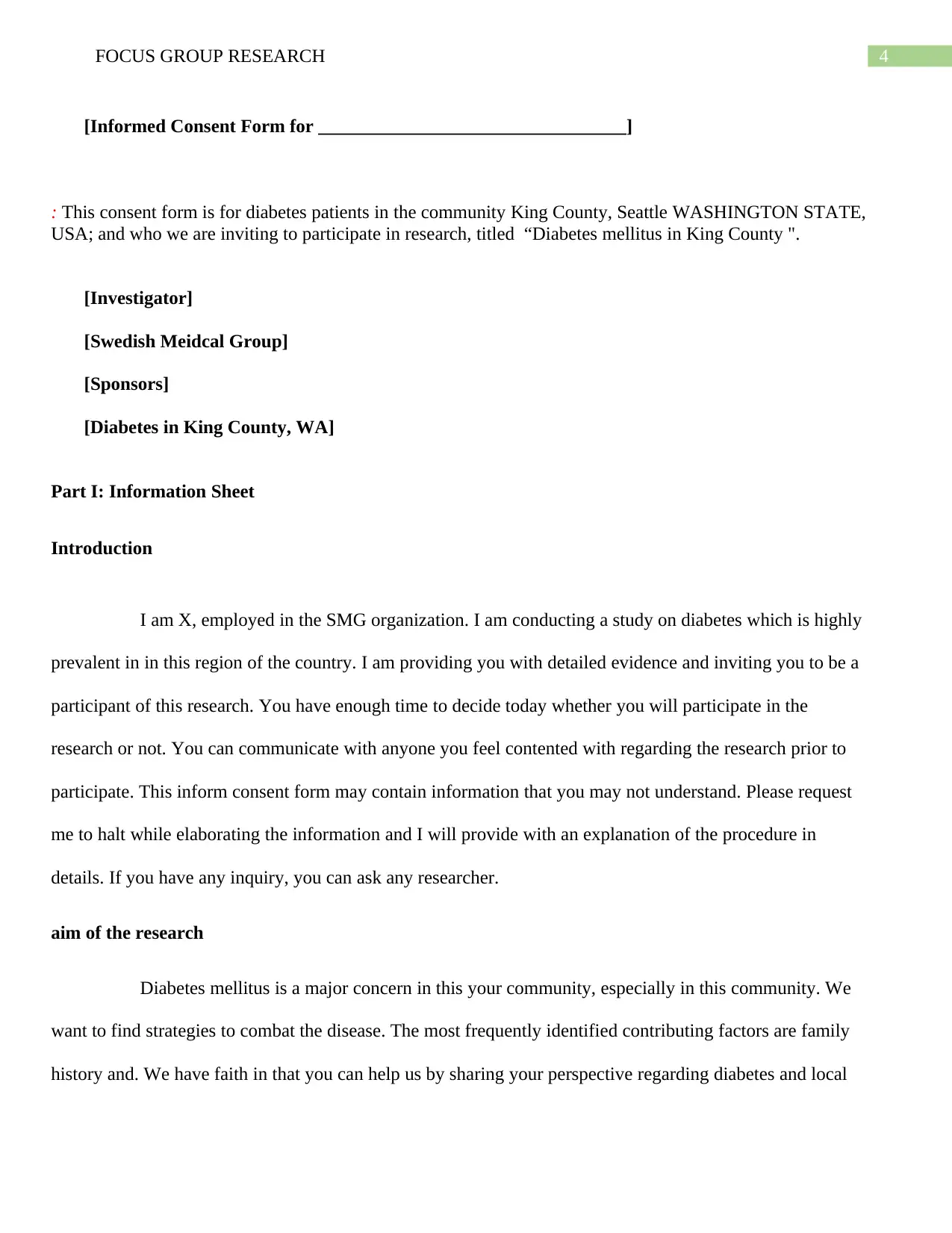
4FOCUS GROUP RESEARCH
[Informed Consent Form for _________________________________]
: This consent form is for diabetes patients in the community King County, Seattle WASHINGTON STATE,
USA; and who we are inviting to participate in research, titled “Diabetes mellitus in King County ".
[Investigator]
[Swedish Meidcal Group]
[Sponsors]
[Diabetes in King County, WA]
Part I: Information Sheet
Introduction
I am X, employed in the SMG organization. I am conducting a study on diabetes which is highly
prevalent in in this region of the country. I am providing you with detailed evidence and inviting you to be a
participant of this research. You have enough time to decide today whether you will participate in the
research or not. You can communicate with anyone you feel contented with regarding the research prior to
participate. This inform consent form may contain information that you may not understand. Please request
me to halt while elaborating the information and I will provide with an explanation of the procedure in
details. If you have any inquiry, you can ask any researcher.
aim of the research
Diabetes mellitus is a major concern in this your community, especially in this community. We
want to find strategies to combat the disease. The most frequently identified contributing factors are family
history and. We have faith in that you can help us by sharing your perspective regarding diabetes and local
[Informed Consent Form for _________________________________]
: This consent form is for diabetes patients in the community King County, Seattle WASHINGTON STATE,
USA; and who we are inviting to participate in research, titled “Diabetes mellitus in King County ".
[Investigator]
[Swedish Meidcal Group]
[Sponsors]
[Diabetes in King County, WA]
Part I: Information Sheet
Introduction
I am X, employed in the SMG organization. I am conducting a study on diabetes which is highly
prevalent in in this region of the country. I am providing you with detailed evidence and inviting you to be a
participant of this research. You have enough time to decide today whether you will participate in the
research or not. You can communicate with anyone you feel contented with regarding the research prior to
participate. This inform consent form may contain information that you may not understand. Please request
me to halt while elaborating the information and I will provide with an explanation of the procedure in
details. If you have any inquiry, you can ask any researcher.
aim of the research
Diabetes mellitus is a major concern in this your community, especially in this community. We
want to find strategies to combat the disease. The most frequently identified contributing factors are family
history and. We have faith in that you can help us by sharing your perspective regarding diabetes and local
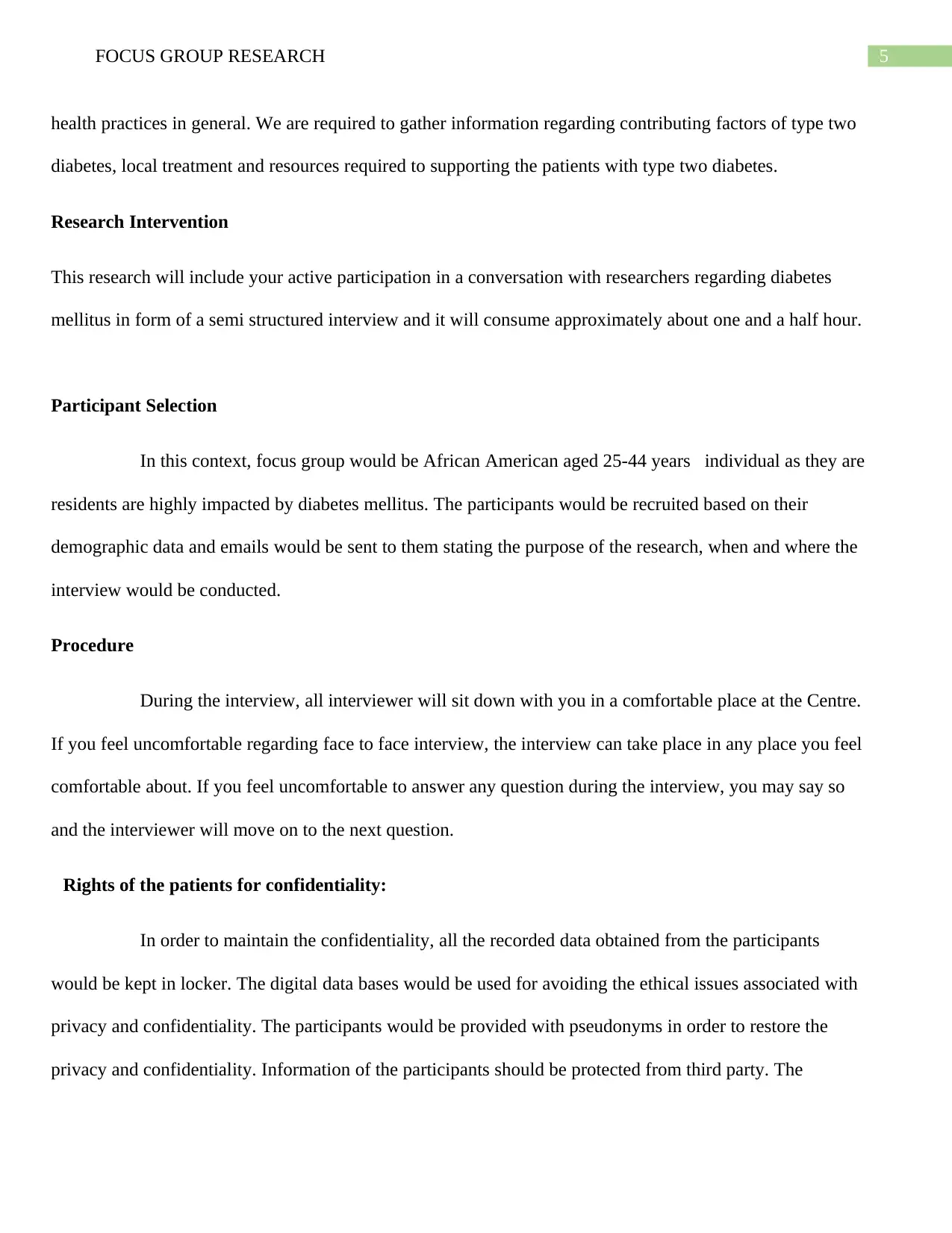
5FOCUS GROUP RESEARCH
health practices in general. We are required to gather information regarding contributing factors of type two
diabetes, local treatment and resources required to supporting the patients with type two diabetes.
Research Intervention
This research will include your active participation in a conversation with researchers regarding diabetes
mellitus in form of a semi structured interview and it will consume approximately about one and a half hour.
Participant Selection
In this context, focus group would be African American aged 25-44 years individual as they are
residents are highly impacted by diabetes mellitus. The participants would be recruited based on their
demographic data and emails would be sent to them stating the purpose of the research, when and where the
interview would be conducted.
Procedure
During the interview, all interviewer will sit down with you in a comfortable place at the Centre.
If you feel uncomfortable regarding face to face interview, the interview can take place in any place you feel
comfortable about. If you feel uncomfortable to answer any question during the interview, you may say so
and the interviewer will move on to the next question.
Rights of the patients for confidentiality:
In order to maintain the confidentiality, all the recorded data obtained from the participants
would be kept in locker. The digital data bases would be used for avoiding the ethical issues associated with
privacy and confidentiality. The participants would be provided with pseudonyms in order to restore the
privacy and confidentiality. Information of the participants should be protected from third party. The
health practices in general. We are required to gather information regarding contributing factors of type two
diabetes, local treatment and resources required to supporting the patients with type two diabetes.
Research Intervention
This research will include your active participation in a conversation with researchers regarding diabetes
mellitus in form of a semi structured interview and it will consume approximately about one and a half hour.
Participant Selection
In this context, focus group would be African American aged 25-44 years individual as they are
residents are highly impacted by diabetes mellitus. The participants would be recruited based on their
demographic data and emails would be sent to them stating the purpose of the research, when and where the
interview would be conducted.
Procedure
During the interview, all interviewer will sit down with you in a comfortable place at the Centre.
If you feel uncomfortable regarding face to face interview, the interview can take place in any place you feel
comfortable about. If you feel uncomfortable to answer any question during the interview, you may say so
and the interviewer will move on to the next question.
Rights of the patients for confidentiality:
In order to maintain the confidentiality, all the recorded data obtained from the participants
would be kept in locker. The digital data bases would be used for avoiding the ethical issues associated with
privacy and confidentiality. The participants would be provided with pseudonyms in order to restore the
privacy and confidentiality. Information of the participants should be protected from third party. The
⊘ This is a preview!⊘
Do you want full access?
Subscribe today to unlock all pages.

Trusted by 1+ million students worldwide
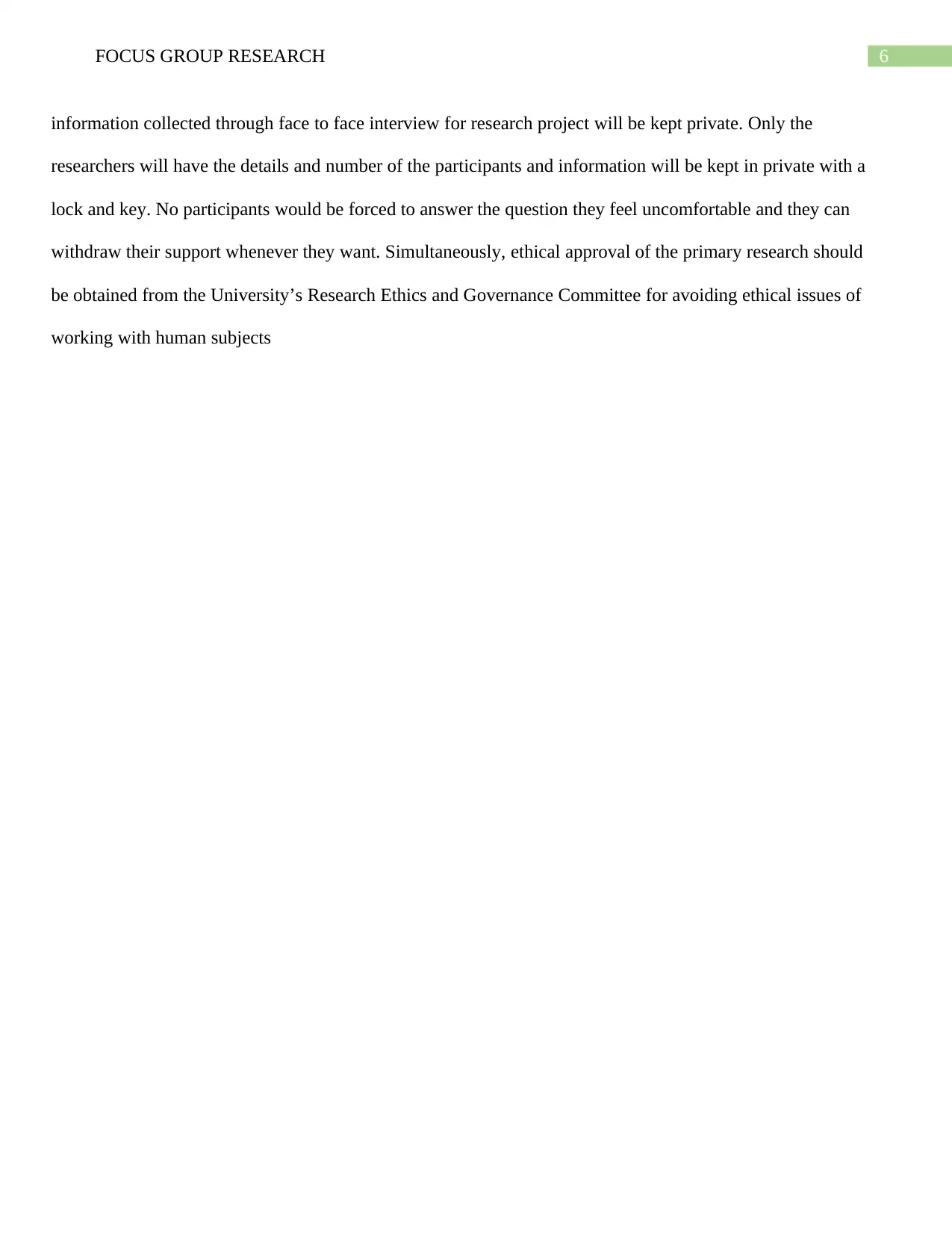
6FOCUS GROUP RESEARCH
information collected through face to face interview for research project will be kept private. Only the
researchers will have the details and number of the participants and information will be kept in private with a
lock and key. No participants would be forced to answer the question they feel uncomfortable and they can
withdraw their support whenever they want. Simultaneously, ethical approval of the primary research should
be obtained from the University’s Research Ethics and Governance Committee for avoiding ethical issues of
working with human subjects
information collected through face to face interview for research project will be kept private. Only the
researchers will have the details and number of the participants and information will be kept in private with a
lock and key. No participants would be forced to answer the question they feel uncomfortable and they can
withdraw their support whenever they want. Simultaneously, ethical approval of the primary research should
be obtained from the University’s Research Ethics and Governance Committee for avoiding ethical issues of
working with human subjects
Paraphrase This Document
Need a fresh take? Get an instant paraphrase of this document with our AI Paraphraser
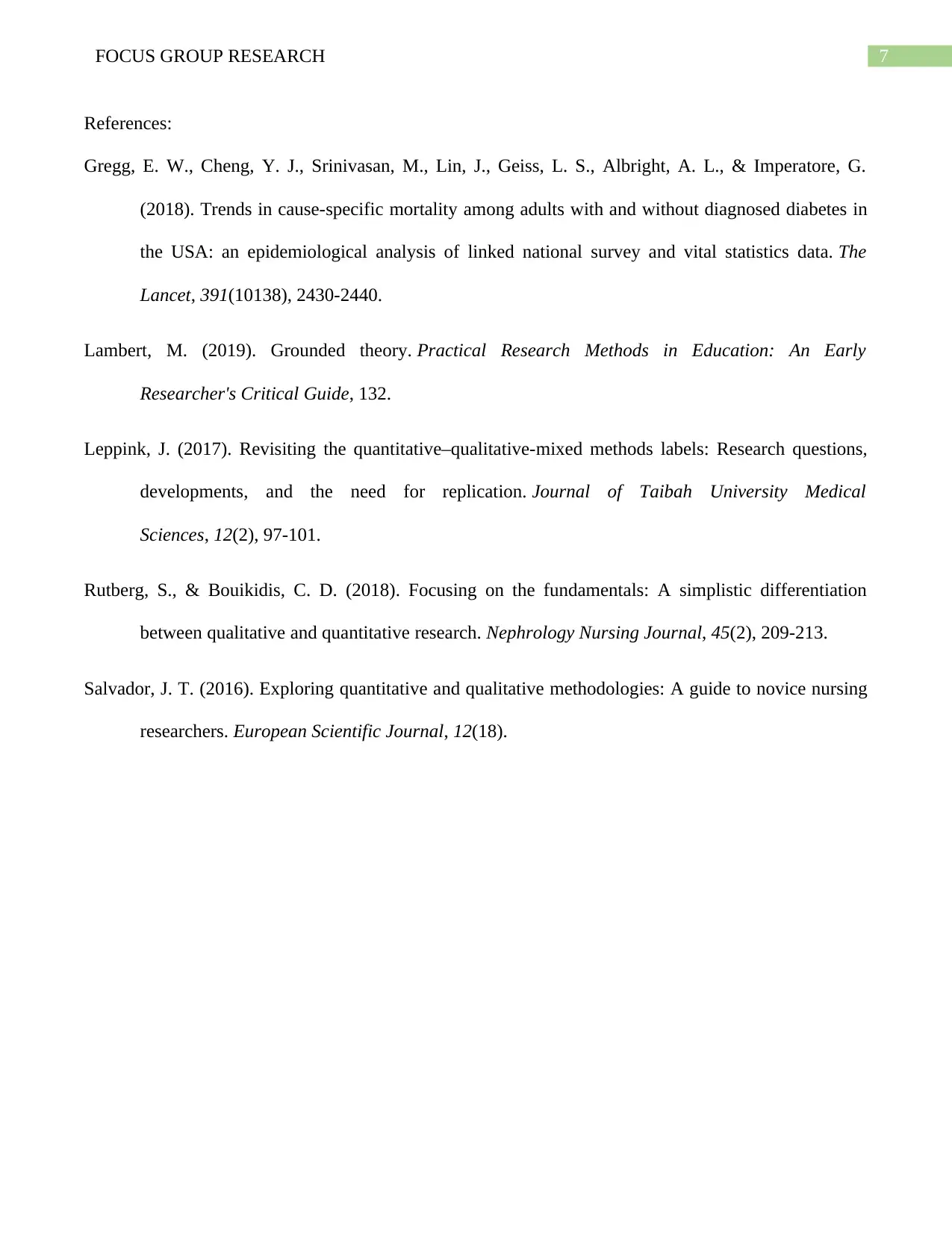
7FOCUS GROUP RESEARCH
References:
Gregg, E. W., Cheng, Y. J., Srinivasan, M., Lin, J., Geiss, L. S., Albright, A. L., & Imperatore, G.
(2018). Trends in cause-specific mortality among adults with and without diagnosed diabetes in
the USA: an epidemiological analysis of linked national survey and vital statistics data. The
Lancet, 391(10138), 2430-2440.
Lambert, M. (2019). Grounded theory. Practical Research Methods in Education: An Early
Researcher's Critical Guide, 132.
Leppink, J. (2017). Revisiting the quantitative–qualitative-mixed methods labels: Research questions,
developments, and the need for replication. Journal of Taibah University Medical
Sciences, 12(2), 97-101.
Rutberg, S., & Bouikidis, C. D. (2018). Focusing on the fundamentals: A simplistic differentiation
between qualitative and quantitative research. Nephrology Nursing Journal, 45(2), 209-213.
Salvador, J. T. (2016). Exploring quantitative and qualitative methodologies: A guide to novice nursing
researchers. European Scientific Journal, 12(18).
References:
Gregg, E. W., Cheng, Y. J., Srinivasan, M., Lin, J., Geiss, L. S., Albright, A. L., & Imperatore, G.
(2018). Trends in cause-specific mortality among adults with and without diagnosed diabetes in
the USA: an epidemiological analysis of linked national survey and vital statistics data. The
Lancet, 391(10138), 2430-2440.
Lambert, M. (2019). Grounded theory. Practical Research Methods in Education: An Early
Researcher's Critical Guide, 132.
Leppink, J. (2017). Revisiting the quantitative–qualitative-mixed methods labels: Research questions,
developments, and the need for replication. Journal of Taibah University Medical
Sciences, 12(2), 97-101.
Rutberg, S., & Bouikidis, C. D. (2018). Focusing on the fundamentals: A simplistic differentiation
between qualitative and quantitative research. Nephrology Nursing Journal, 45(2), 209-213.
Salvador, J. T. (2016). Exploring quantitative and qualitative methodologies: A guide to novice nursing
researchers. European Scientific Journal, 12(18).
1 out of 8
Related Documents
Your All-in-One AI-Powered Toolkit for Academic Success.
+13062052269
info@desklib.com
Available 24*7 on WhatsApp / Email
![[object Object]](/_next/static/media/star-bottom.7253800d.svg)
Unlock your academic potential
Copyright © 2020–2026 A2Z Services. All Rights Reserved. Developed and managed by ZUCOL.





